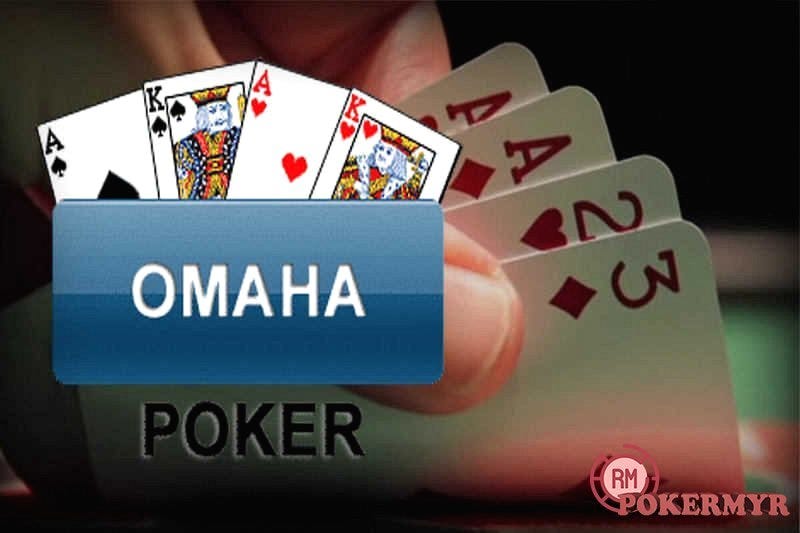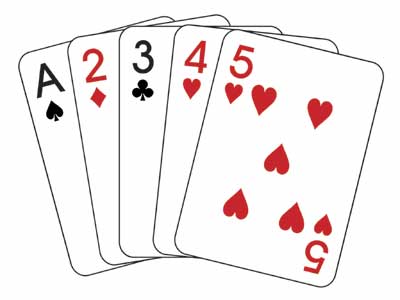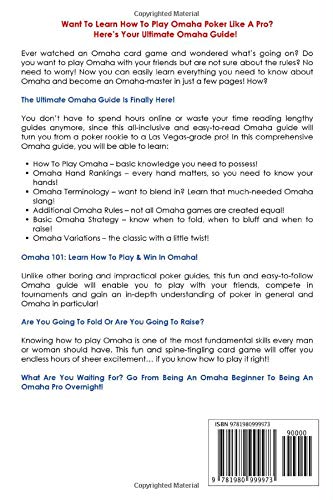How Do You Play Omaha Poker Rules
Limit Omaha 8 or Better uses a 'blinds' structure: The player to the left of the dealer button puts in. In Omaha, players are dealt four face-down cards. Afterwards, each player gets a chance to exercise his betting options. Next, three cards are dealt simultaneously on the table for all players to share. This is called the flop, and it is followed by another round of betting. In a no limit omaha game, any player at any time can move all of their chips into the middle — go “all in.” In a pot limit game the biggest raise can not be any bigger than the size of the current pot. For example, if the pot had $10 in it, then the next raise cannot be any bigger than $10.

- Omaha Poker is a community poker game that can be played with anywhere from 2-10 players. One player acts as dealer. This position is called the button and it rotates clockwise after every hand. The two players to the left of the dealer are called the small blind and the big blind, respectively.
- Betting Rules Omaha Hold’em (also known as just Omaha) is a game that plays similar to Texas Hold’em, but with a few key differences. A (very strong) hand in Omaha Poker. Like Texas Hold’em, the object of Omaha is to make the best possible five-card hand, using a combination of hole cards and five community cards.
Will it ever catch up and become the preferred game for most poker players - either online or live? Well, no. Odds are low.
While heavy poker players might get bored with Hold'em after a while (read: 400,000 hands) and make the switch to Omaha, Hold'em is still the perfect game for most recreational and amateur players.
The rules are simple, the rush of a massive all in will always make for great and memorable moments (win or lose) and the game offers enough complexity to unfold in different layers over years of play.
Omaha Poker ... it's a great action game. At least Pot-Limit Omaha is. And you'll get a lot of big hands, which is fun. Omaha also offers a ton of complex strategy to chew on for years.
But it just doesn't have quite the 'je ne sais quoi' of Hold'em. And it's not quite as accessible for the average player. It may 'only' be 2 extra cards but it's enough to keep it running slightly behind Hold'em as the game of choice for the poker world writ large.
That being said ... you should learn to play it! The Omaha strategy you learn will pay off ten-fold in your Hold'em game. It's also an essential component of being a great mixed-game player. And, when it comes right down to it, Omaha poker really is fun.
As an added bonus Omaha poker rules are very similar to Texas Hold'em so it won't take long to make the leap. Below we'll break down the basic rules and game play of:
- Omaha High
- Omaha Hi-Lo (Omaha 8 or Better)
How to Play Omaha Poker
Good news! The rules of Omaha Poker are virtually identical to the rules of Texas Hold'em poker. It's a community card game, there are blinds and four rounds of betting, the highest 5-card poker wins.
Omaha Poker Rules Pdf
There are two basic differences between Hold'em and Omaha:
- Each player gets 4 hole cards in Omaha (vs. 2 in Hold'em)
- You MUST use exactly 2 of your hole cards to make your best 5-card poker hand
And that's pretty much it (outside of the Hi-Lo variation of Omaha - more on that below). The hardest thing to get used to probably is needing to use exactly 2 of your hole cards to make your best hand. That means you can't:
- Play the board
- Use one of your hole cards
Otherwise game play goes along identically to Texas Hold'em so if you've played it before you'll be fine switching over to Omaha. If you need a quick refresher on the basic rules of Omaha play, here's it is:
Rules of Omaha Poker (High)

- 2-10 players at each table
- Small Blind and Big Blind are paid each hand
- Player directly to the left of the dealer pays the small blind
- Player directly to the left of the small blind pays the big blind
- Dealer button and blinds rotate to the left after each hand
- Each player is dealt 4 hole cards in sequence for each hand
- First betting round begins with the player to the left of the big blind
- After all the bets are matched dealer burns one card and then deals 3 cards face up in middle of the table. This is called the flop.
- Flop cards are community cards each player can use to make their final hand
- After the flop a second betting round begins starting with the player closest to the left of the dealer still in the hand
- Once all bets are matched dealer burns one more card then deals another community face up card on the board (the 'turn')
- Third betting round begins after the turn, again starting with player to left of dealer
- Once all best are matched dealer burns one card and deals a fifth community (the 'river')
- The fourth and final betting round begins again with player closest to left of dealer
- Once all bets are matched all players left in hand reveal hands for showdown
- Best high 5-card poker hand wins with each player using exactly 2 of their original four hole cards
The final point is a very important distinction for Omaha poker. Each player's best 5-card hand must have:
- 2 hole cards
- 3 board cards
That's it. No variations are possible - ie one hole card plus 4 board cards, all board cards. If you need a refresher for the poker hand rankings, here it is:
- Royal Flush (A, K, Q, J, 10 all of same suit)
- Straight Flush. (5 cards in sequence all in same suit - eg 7h-8h-9h-Th-Jh)
- Four of a Kind. (All four cards of same rank)
- Full House. (3 cards of one rank alongside 2 cards of another - eg. 6h-6s-6d-8d-8c)
- Flush (All 5 cards or one suit, any rank)
- Straight (A sequence of 5 cards of rank, any suit - eg, 2h-3d-4c-5s-6c)
- Three of a kind (3 cards or any one rank, two unmatched cards)
- Two pair (Two different pairs plus one unmatched card)
- One pair (One pair of equal rank, 3 unmatched cards)
- High Card (all unmatched cards ranked by the highest single card)
Play Omaha Poker
Another important note about Omaha Poker Rules:
Omaha is typically only played in either Limit or Pot-Limit format. It is RARELY played as No-Limit. The action is already pretty hectic as it is so No-Limit is not a preferred format for playing. Omaha poker.
Perhaps the most popular form of Omaha poker is Pot-Limit Omaha, which is played by all the best high-stakes pros and is a super fast, super fun action game played at all stakes.
The trickiest part of learning to play Pot-Limit Omaha is figuring out how to calculate what your pot-size bets and raises can be on each street. As luck would have it, we've put together a guide to calculating pot bets right here to help you along:

If you'd like to learn more about betting formats, betting rules & betting order, check our Betting Rules article here:
Omaha Poker Rules -- Hi-Lo (Omaha 8-or-Better)
More good news for people who hate learning new rules: the only way Omaha High and Omaha Hi-Lo differ is when it comes to the showdown.
In standard Omaha High (and Pot-Limit Omaha), the high hand wins the whole pot - just like Texas Hold'em. Again, there are the hand rankings up above if you need a refresher.
In Omaha Hi-Lo, the pot is split between the best high hand and the best low hand. As you might guess from the name above, there's also a catch:
The low hand has to be '8 or Better' to qualifying for that half of the pot. In other words a qualifying low hand must have:
- 5 unpaired cards all ranked at 8 or below
The 'better' part might be a bit confusing there as they all have to be lower than 8 rather than higher than 8, but in terms of a lowball game that means that are technically 'better.'
Some more important points of note for ranking Omaha 8-or-Better low hands:
- Aces are both high and low - high for the high hand and low for the low hand
- Flushes and straights DO NOT COUNT for the low hand but DO count for the high hand
- Low hands are ranked from the high card down, so the lowest 'high' card in the low hand determines the ranking
- Players still have to make up their high and low hands from exactly 2 hole cards and 3 board cards
- Players can use the same cards to make up their best high hand and their best low hand or use different cards
- Any pair or card higher than 8 disqualifies a hand from being able to win the low share of the pot
- Pairs under 8 still disqualify a low hand
- If the highest low card is the same in two players' hands the next lowest card determines the winner
- If players share the same low hand they split the half pot between them - this is called getting 'quartered'
The lowest possible hand in Omaha 8-or-better is: 5-4-3-2-A, which is called a 'Five Low.' It also counts as a straight or 'wheel' for the high hand.
Play Omaha Poker Free Online
The best way to get a handle on Omaha poker rules is really simply to play some hands and see how it goes. If you're coming over from Texas Hold'em the rules don't change that much and the betting rounds are still all the same.
It takes some getting used to to think of using exactly 2 hole cards to make up your final hand (and getting into the logistics of Hi-Lo is another step altogether) but Omaha is a very fun game filled with action that will keep you very entertained while you learn the ropes.
If you're want to learn quickly you can get A LOT of Omaha hands in online by playing the free games offered at major poker sites including 888poker, PokerStars and William Hill Poker, to name a few.
As an added bonus, if you're worried about being able to calculate pot bets on the fly for Pot-Limit Omaha, the online software calculates it for you!
You will still need to sign up and create a registered account at the poker site itself but you do not have to make a deposit to play the free Omaha poker games. Simply click on the 'free play' or 'instant play' under the Omaha games tabs.
Read our reviews and get exclusive poker bonuses here:
After you've got up to speed with the rules of Omaha and the pace of the game, it's very easy to make a small deposit and jump into the microstakes cash games or tournaments.

Omaha has a very steady player base at all levels so you'll have no problem finding a game that suits your skill and bankroll. Good luck and enjoy the great game of Omaha poker!
Related Poker Games Rules
Poker Tools:
More on Poker Sites, Poker Games & Poker Bonuses
Omaha is an exciting poker variant, and although it bears a striking similarity to Texas Hold’em, it stands in a class of its own.
Once poker players have understood the basic rules of playing Omaha Poker and played a few games for real money, they would want to know the secrets of playing a winning game of Omaha Poker.
Here are 10 tricks to winning at Omaha Poker.
- Know the Rules Omaha players will naturally be disappointed when the read the first secret to playing a winning game of Omaha Poker – know the rules. However, they must understand that it is literally impossible to understand any Omaha Poker strategy until and unless they have thoroughly understood the rules of Omaha Poker at the deepest level.
- Mark the DifferenceMany beginners play a miserable game of Omaha Poker because they do not realize the difference between Hold’em and Omaha. Players of Omaha have to create a strong five-card hand using two hole cards and three community cards, and this is what makes Omaha Poker more challenging than Texas Hold’em.
- Choosing Best Starting HandsA standard deck of 52 playing cards can be used to create 5,277 combinations, provided only four cards are used and suited combinations are not considered. Successful Omaha players understand these combinations very well.
- All Four Cards Are ImportantWhile it is true that players can use only two of their hole cards to create the strongest hand, they must carefully study all the four cards in their starting hand. Thinking of the various combinations that can be created with these four cards will help players understand better their odds of winning.
- Ace Pair Having a pair of Aces in one’s starting hands is something to be happy about. For instance, if players are dealt an Ace of Spades, an Ace of Diamonds, a King of Spades, and a King of Diamonds, they will do very well on the flop. An excellent Omaha Poker strategy would be to play a starting hand with an Ace pair.
Learn the basic Omaha Poker Rules
This video has been provided by online-casinos.com
- Aces Are Not Everything Simultaneously, an ace is not everything and it definitely does not promise the jackpot. While having an Ace in the starting hand is always beneficial, a lot depends on the other cards in the hand. Even if players get an Ace pair, if they have cards such as Five of Clubs and Nine of Hearts with their Ace pair, they will not be able to win. However, if the opponent does not have an Ace in his/her starting hand, the above-mentioned hand can be played. A list of great starting hands with Ace pairs would include AAQQ, AA99, and AAJJ, to mention just a few.
- Kings and Queens Omaha players who are dealt Kings and Queens in their starting hands can also play their hands, provided they have another strong pair. For instance, a King of Diamonds, a King of Spades, a Queen of Diamonds, and a Queen of Spades comprises a great starting hand, but a King of Diamonds, a King of Spades, a Nine of Spades, and a Nine if Diamonds is not really a good hand to play. Players can consider playing starting hands with pairs of cards, suited connectors, flushes, and connectors.
- The Best Can Be the Worst Sometimes players might receive cards that look excellent, but have absolutely no potential of winning. For instance, beginners will jump for joy if they get four cards from the same suit or a three of a kind, but such hands are useless to Omaha players because they can use only two of their hole cards and 3 community cards to create a winning hand. Such hands are, therefore, better folded.
- Identify Worthless Hands Omaha players must understand that they cannot play all starting hands. If they get dealt a hand that has no potential of becoming a winner, they had better fold. Players must learn the art of distinguishing worthless hands from valuable starting hands.
- Best Omaha Starting Hand The best Omaha starting hand can, therefore, be defined as a hand comprising four great cards that can work collaboratively to create a strong poker hand for the player. Players should look for card pairs, complimentary cards, suited cards, connected cards, and even a pair of deuces.